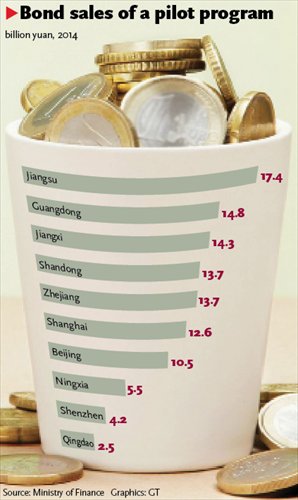HOME >> BUSINESS
Local govts get more leeway in issuing bonds
By Li Qiaoyi and Zhang Ye Source:Global Times Published: 2014-9-1 0:08:11
NPC approves budget law revision

Workers install laser projection equipment on the Bund in Shanghai. Photo: IC

Bond sales of a pilot program
The Standing Committee of the National People's Congress (NPC), China's top legislature, on Sunday passed a revision to the nation's budge law which lays the legal framework for bond issuance by local governments, a key move to tackle the local government debt woes.
The 10th session of the 12th NPC Standing Committee approved the amendment to the budget law at its closing meeting on Sunday, by 161 votes to two, with seven abstentions, He Shaoren, head of the news office of the legislature, told a news conference in Beijing.
The new bill submitted for the fourth reading at the bimonthly session provides greater transparency on government budgeting and lays the legal framework for eligible provincial-level governments to sell bonds to raise funds for public interest projects.
A fiscal reporting and discussion system will also be set up and governments will be required to publicize their balance sheets, with a rating system introduced in an assessment of their finances, Finance Minister Lou Jiwei said at the news conference.
The nation's current budget law came into force in 2005 and it was not until 2011 when an amendment of the law was presented for the first reading to address concerns over limited public access to and supervision of governments' budgets.
Under the amendment of the law, local governments will be endowed with the legal right of bond issuance to support their increasing fiscal expenditures and clear up their debts on their own in a more regulated fashion, Xu Hongcai, director of the Department of Information under the China Center for International Economic Exchanges (CCIEE), a Beijing-based government think tank, told the Global Times on Sunday.
Before the new bill was passed, the Ministry of Finance had made a watershed move in May by announcing that 10 local governments including Shanghai, Beijing, East China's Zhejiang Province and South China's Guangdong Province will be allowed to sell and repay their own bonds.
Local governments were previously not entitled to issue bonds on their own and had to rely on the Ministry of Finance, which created heavy burden on the central government, said Zhang Guangtong, vice president of the School of Taxation with the Central University of Finance and Economics.
"Meanwhile, according to the current mechanism, local governments sometimes cannot get the bond income from the ministry on time for debt repayment, resulting in use of unsupervised back doors to raise funds," Zhang told the Global Times on Sunday.
But local governments cannot sell bonds above quotas approved by the State Council, the country's cabinet, according to the revised bill, in a suggestion of the central government's caution on letting local governments issue bonds on an unrestricted basis.
To prevent local governments from issuing bonds randomly, more supporting measures and regulations are needed, Xu at the CCIEE noted.
On top of the disclosure of the balance sheets of local governments and the establishment of a third-party credit rating mechanism to assess the local government bonds, the central government should clearly define a trading place for government bonds, he suggested.
Overall, the nation's local debt risk remains controllable, Lou the finance minister said, noting that the debt balance of local governments has seen no conspicuous rise.
Between the end of June 2013 and end of March 2014, the average growth in debt balance of nine provincial governments and nine city-level governments audited was down 7 percentage points from that logged in the first six months of 2013, the National Audit Office said in an audit report in June.
Posted in: Economy